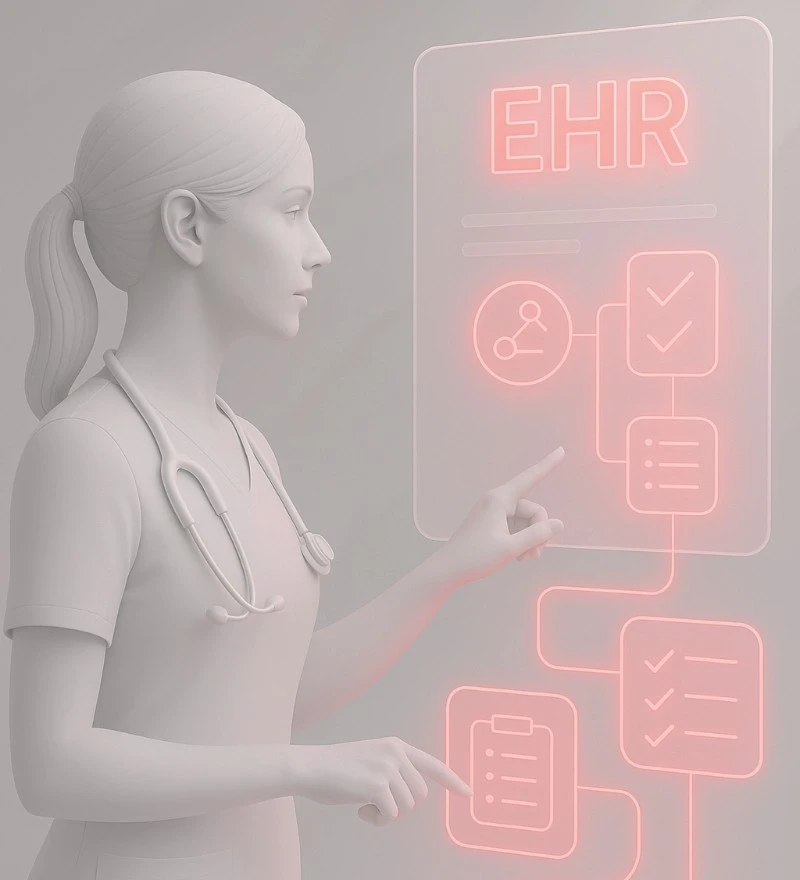Custom EHR Software Development Services
Transform Healthcare Delivery with Tailored Electronic Health Record Solutions
Healthcare organizations face unique challenges with off-the-shelf EHR systems that often fail to align with specialized workflows, integration needs, and organizational goals. Our custom EHR software development services offer a revolutionary approach to creating electronic health record systems that truly fit your practice, enhancing clinical efficiency, improving patient care, and maximizing return on technology investment.
Use Cases for Custom EHR Software Development
Specialty Practice Solutions
Address unique clinical requirements. Our custom ehr development creates specialty-specific systems with tailored templates, workflows, and decision support for disciplines like cardiology, orthopedics, oncology, and behavioral health.
Multi-specialty Enterprise Platforms
Unify diverse clinical environments. We develop comprehensive EHR solutions that accommodate different specialties within a single platform while maintaining the unique workflows each department requires.
Telehealth-Integrated Systems
Support modern care delivery models. Our custom EHR solutions seamlessly incorporate virtual care capabilities, remote monitoring integration, and digital patient engagement tools for comprehensive hybrid care delivery.
Research-Enabled Clinical Systems
Advance medical knowledge while delivering care. We create EHR platforms with integrated research capabilities, including protocol management, cohort identification, and structured data collection that supports both clinical care and research initiatives.
Value-Based Care Platforms
Thrive in new payment models. Our custom ehr software development builds systems with robust population health management, quality measure tracking, and outcomes analysis to support success in value-based care arrangements.
Key Benefits of Custom EHR Software Development
Optimized Clinical Workflows
Enhance provider efficiency and satisfaction. Our custom ehr solutions are designed around your actual practice patterns, not generic templates—reducing clicks, streamlining documentation, and allowing clinicians to focus on patients rather than software.
Seamless Integration Ecosystem
Eliminate information silos. Custom EHR development enables perfect integration with your existing systems, from practice management and billing to specialty diagnostic tools and remote monitoring platforms.
Specialty-Specific Functionality
Support your unique clinical needs. We develop specialized modules and interfaces for different medical specialties, from dermatology and ophthalmology to behavioral health and oncology, with terminology, templates, and tools tailored to each discipline.
Scalable Growth Path
Evolve at your own pace. Our custom EHR software development creates flexible platforms that can adapt to changing requirements, growing patient volumes, and emerging healthcare models without disruptive replacements.

5 Steps To Launch Your Custom EHR In Just 16-36 Weeks
COMPLIANCE
WITH HEALTHCARE STANDARDS








Our Other Healthcare Software Services
Healthcare AI solutions
We build AI-boosted healthcare products from scratch, empowering your existing software with AI capabilities, augmenting your internal AI experts team, and more.
Interoperability solutions
Leverage our expertise in cross-platform healthcare data interoperability, FHIR/HL7 integrations with Epic and other EHRs, SMART on FHIR development, healthcare data analytics on FHIR, and data conversion to FHIR.
Cloud services
We support healthcare organizations with cloud infrastructure security audits, optimization, automation, and maintenance. We will help you migrate heavy legacy software to the cloud.
Compliance services
We consult about HIPAA, SO13485, IEC62304, SOC2, FDA, and HITRUST. We suggest QMS setup and management, software verification, FDA-compliant technical documentation, and more.
FAQ AboutCustom EHR Development
How does custom EHR development compare to implementing off-the-shelf systems?
Custom EHR development offers significant advantages over generic solutions, particularly for organizations with unique workflows or specialty requirements. While off-the-shelf systems provide faster initial implementation, they often require substantial workflow changes to accommodate the software’s limitations. Our custom approach inverts this relationship—we adapt the software to your optimal workflows rather than forcing your team to change their practices. Custom development typically requires more upfront investment but delivers greater long-term value through higher efficiency, better user satisfaction, and reduced workarounds. Most importantly, custom EHRs eliminate the compromise between software capabilities and clinical needs, allowing you to implement exactly what your organization requires.
How do you ensure regulatory compliance in custom EHR systems?
Compliance is integrated throughout our custom EHR software development process. We implement a comprehensive regulatory framework that addresses HIPAA privacy and security requirements, HITECH provisions, and applicable ONC certification criteria. Our development includes structured risk assessments, security controls implementation, and detailed documentation to support your compliance efforts. For organizations requiring certified EHR technology for programs like Promoting Interoperability, we can design systems to meet certification requirements and support the certification process. Our compliance approach also addresses state-specific regulations, specialty-specific requirements, and international standards for global healthcare organizations.
What is your approach to data migration from legacy systems?
Our custom EHR development includes comprehensive data migration strategies tailored to your specific situation. We begin with a detailed assessment of your current data structures, quality, and volumes. Our migration methodology includes data mapping, transformation rules, and validation processes that ensure accurate transfer while improving data quality. For complex migrations, we implement a phased approach that prioritizes critical information while maintaining access to historical data. We typically develop custom migration tools specific to your legacy system, with extensive testing and validation before final cutover. Our team also provides strategies for handling legacy data that may not fit cleanly into new structures, ensuring no valuable information is lost during transition.
How do custom EHRs integrate with other healthcare systems?
Integration capabilities are a core strength of our custom EHR solutions. We implement comprehensive interoperability features, including support for healthcare standards like HL7, FHIR, DICOM, and SMART on FHIR. Our systems can integrate with practice management, billing, laboratory, radiology, pharmacy, and specialty clinical systems through various mechanisms, including APIs, web services, and direct database connections. We develop detailed interface specifications for each integration point, implement appropriate security controls, and conduct thorough testing to ensure reliable data exchange. Our architecture supports both real-time and batch integrations, with monitoring tools to ensure ongoing connectivity across your healthcare ecosystem.
What security measures do you implement in custom EHR systems?
Security is paramount in our custom EHR software development. We implement a defense-in-depth approach that includes multiple layers of protection: application-level security with role-based access controls and detailed audit logging; data security through encryption at rest and in transit; infrastructure security with network segmentation and intrusion detection; and operational security through monitoring and incident response capabilities. Our development process includes threat modeling to identify potential vulnerabilities, with security controls implemented from the earliest design stages. We also provide security documentation, support penetration testing, and offer ongoing security assessment services to maintain protection against evolving threats.
How do you support the transition from existing systems to a new custom EHR?
Our custom EHR development includes comprehensive change management to ensure successful adoption. We begin with stakeholder analysis and readiness assessment to identify potential challenges and resistance points. Our implementation approach typically includes pilot deployments with champion users, allowing for refinement before full rollout. We provide extensive training tailored to different user roles, with both classroom sessions and at-the-elbow support during go-live. Our team develops detailed cutover plans that minimize disruption to clinical operations, with contingency procedures for addressing unexpected issues. Post-implementation, we offer adoption monitoring, targeted interventions for struggling users, and continuous optimization based on real-world usage patterns.
Can custom EHRs support telehealth and remote patient monitoring?
Absolutely. Our custom EHR solutions excel at integrating virtual care capabilities. We develop systems that seamlessly incorporate video consultation workflows, remote monitoring data integration, virtual waiting rooms, and digital patient engagement tools. The custom approach allows us to create unified workflows that bridge in-person and virtual care, maintaining clinical continuity across different care modalities. We implement secure messaging, file sharing, and collaborative documentation features that support care team coordination regardless of physical location. For organizations with existing telehealth platforms, we can integrate with these systems; for those seeking comprehensive solutions, we can build telehealth capabilities directly into the custom EHR.
What is the typical timeline and cost for developing a custom EHR?
The timeline and cost for our custom EHR development services vary based on scope, complexity, and integration requirements. Basic specialty-specific EHRs typically require 16-24 weeks, while comprehensive enterprise solutions may require 24-48 weeks. Investment ranges from $200,000-$500,000 for focused implementations, with enterprise-grade platforms ranging from $500,000-$2,000,000. These estimates include design, development, testing, data migration, and initial deployment. We offer flexible engagement models, including phased implementations that deliver core functionality quickly while expanding capabilities over time. While custom development requires greater initial investment than off-the-shelf systems, most clients achieve positive ROI within 18-36 months through improved efficiency, reduced workarounds, and better alignment with revenue-generating workflows.




